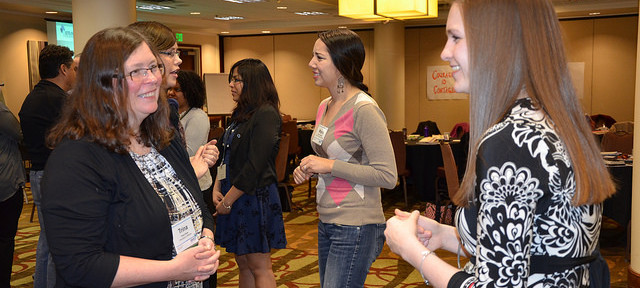 Approaching a new academic year is a lot like New Year’s Eve: It offers much of the same excitement, anticipation and hopes of good fortune that a new calendar year has come to symbolize. It’s also a time when we develop resolutions, consciously or not. We want to do well in our programs, we want the best for our clients and students, we want successful (and publishable) research and we want to be part of a thriving profession.
Approaching a new academic year is a lot like New Year’s Eve: It offers much of the same excitement, anticipation and hopes of good fortune that a new calendar year has come to symbolize. It’s also a time when we develop resolutions, consciously or not. We want to do well in our programs, we want the best for our clients and students, we want successful (and publishable) research and we want to be part of a thriving profession.
There’s one resolution that I think could benefit all of us in graduate school, whether student or teacher: being more open to receiving and delivering thoughtful, meaningful and constructive feedback. I am continuously struck by the stories I hear in which feedback is simply omitted or is delivered in a way that hurts rather than helps students. But such feedback is critical to our individual growth and development. After all, we are in school to learn and what better way to learn than through constructive feedback?
How can we as graduate students foster a culture shift in how feedback is delivered and utilized within psychology graduate training? Here are a few suggestions:
Listen like you believe. Obviously, not everything that is said to us throughout our training is going to fit with personal goals, values, and the way we operate as individuals. However, it is amazing what might be discovered when we are open to suggestions and areas of growth. You might just discover something that helps advance your career in incredible, unexpected ways! Listening as thought you believe, opens your mind to exploring alternatives and ultimately deciding what pieces fit for you and what does not. And on the flip side, when you provide feedback to others, whether they are peers, students or faculty members, deliver a message you believe. Be honest and genuine. If necessary, use the classic feedback sandwich structure: positive, constructive, positive.
Be concrete in your feedback and anchor it with behavior. We have all had experiences with vague feedback. For example, “You need to work on your professionalism.” There is no way to know what that means or how to improve it without concrete, actionable steps. So while providing your honest genuine feedback, be sure to anchor it. This also helps in delivering feedback in a constructive and digestible way. When you are receiving feedback, be sure to ask for and clarify the behavioral anchor so you know what to work on.
Set a timeline and check back in. Whether you are providing or receiving the feedback, it is important to evaluate your progress. Write down how you are going to incorporate feedback and set timelines where necessary to keep yourself on track. Enlist support and accountability from others if needed. Thinking over feedback and talking it over with those you’ve given it to is essential to continued professional growth and development.
Celebrate Accomplishments. When you have reached a goal of successfully incorporating feedback, go celebrate! Too often we keep our nose to the grind tackling one task after another chasing a moving cart. It is okay to stop, breathe and take a moment to embrace life through celebrating your accomplishments. Don’t forget to celebrate the accomplishments of others to whom you have given feedback! Some of my favorite ways to celebrate include taking a day off from working, reading a book for pleasure, going out to dinner or hosting a potluck with friends, going to the movies or indulging in a guilt-free Netflix binge!
I hope these steps help you to engage in the feedback process in a meaningful way. If you have more tips or an experience to share, we would love to hear about it! Sign up to be a guest contributor to the blog and share your story. Happy “New Year”!



 I just returned from a professional conference…not a big national one like the APA Convention, but a great statewide (Colorado) effort to build communication and increase collaboration and shared vision between a variety of different service providers (teachers, mental health counselors, the juvenile justice system, case workers, and academics) working with children and adolescents. I had the unique opportunity to provide a 90 minute workshop on managing vicarious trauma–best defined—at least in my eyes—by Figley (1982) as the cost of caring.
I just returned from a professional conference…not a big national one like the APA Convention, but a great statewide (Colorado) effort to build communication and increase collaboration and shared vision between a variety of different service providers (teachers, mental health counselors, the juvenile justice system, case workers, and academics) working with children and adolescents. I had the unique opportunity to provide a 90 minute workshop on managing vicarious trauma–best defined—at least in my eyes—by Figley (1982) as the cost of caring.
 One of the best reasons to go to
One of the best reasons to go to